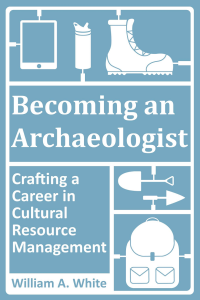I’m currently teaching an archaeological field school at the Estate Little Princess in the United States Virgin Islands (USVI) and I keep finding myself giving tips to the aspiring archaeologists on our crew. Most of these students are early in their career and I feel compelled to help share some of the things I’ve learned doing archaeology since 2004. I also just had my birthday in the field and, at 44 years old, my body is starting to feel all those shovel probes dug, excavation units scratched out, and transects chopped with a machete over the past decades.
None of us is getting any younger but, fortunately, some of us are getting smarter from life experience. All these weeks spent giving advice has compelled me to write a short blog post about a few of the things I’ve learned over the years doing cultural resource management archaeology and as an archaeology professor.
In no particular order, here are 37 things I’ve learned in nearly 20 years of working as a professional archeologist in the United States:
1. Your body and mind are your livelihood. Yoga and Pilates for your body. Meditation and counseling for your mind.
2. CRMers do not get paid to save archaeological sites. Your job is not to protect sites. Your job is to provide professional recommendations that allow clients to better manage sites they own or administer.
3. Archaeology is just one of many careers you will have. Quit when the job no longer suits you.
4. For a professional, archaeology is just a job. Being an archaeologist is not all you are.
5. College matters. It’s not just for you to get a job. College proves you can stick with a difficult task for years and see it through to completion. It is also supposed to help you learn how to learn.
6. When interpreting an archaeology site, think like a human. What did they want out of life while creating this site? All humans do what they want because they want to survive. We always have. What goals did they have? What did they have to do to achieve their goals?
7. People in the past were just like people in the present. Same dissatisfaction with the present life. Same unawareness of reality. Same struggle to alleviate this dissatisfaction even though we don’t understand the world in which we live.
8. BIPOC and white archaeologists want the same things out of life. We are not as different as they make you think we are.
9. There are benefits and drawbacks to turning your dream into a job. Whoever said that stuff about turning your dream into a job and you’ll never work a day in your life was wrong because turning your dream into job prevents your dream from being a dream and keeps your job from just being a job.
10. Getting a PhD to become an archaeology professor is the wrong motivation.
11. You need a Master’s to do archaeology until you retire. Unless you want to retire before 65 years old, when your body breaks from doing this job. You do not need a PhD, however.
12. Invest in good boots. Your body will thank you later.
13. Don’t overdo it. Pay special attention to your back, knees, ankles, shoulders, elbows, wrists, and hands. Watch for heat illnesses, frost bite, ticks, and pit vipers.
14. Be selective of your advisors. Pay attention to what they do and how they live their lives. Also, pay attention to whether or not they let you know about their lives. What are they hiding? You can see who they really are by being attentive to what they do.
15. Lay off the alcohol.
16. Never separate yourself from your lunch.
17. You always need proper pants, a backpack, water, lunch, writing utensils, a notebook, a tape measure, a card for taking pictures of artifacts, and a compass. Don’t show up to work unprepared.
18. Know your gear and how to use it.
19. Know your artifacts. You need to know how to identify lithic materials, groundstone, projectile points and their regional variants, and Native American ceramics. You also need to know historical bottles and ceramics, and their date ranges. You need to know all of this stuff off the top of your head because you won’t always have your phone and you won’t always have time to look things up on it. Plus, it’s just good practice to keep learning what you don’t know.
20. A smartphone can be an excellent companion but don’t use it as a crutch. Use your phone to store archaeology articles and books, maps, and CRM reports. Don’t use your phone as a compass.
21. Always keep learning. You will never know it all but don’t stop trying.
22. Be respectful. All of this is someone’s ancestor.
23. Prioritize health and safety. No project is worth dying for.
24. Be a good citizen, professional, scholar, and colleague. Archaeology is a small world. You never know how things you say and do will affect your career later on down the road. Expect the same from your colleagues.
25. Most professors don’t know CRM. They never will. Do not look towards academia for solutions or answers.
26. For a professional, the best day doing archaeology is better than the best day at any other job.
27. Never neglect your family or personal life for your job. They matter much more than archaeology.
28. Know your worth. CRM companies need you more than you need them. You can do archaeology for free, but they can’t do CRM for free.
29. Eat proper meals. Veggies, carbs, and protein at every meal you can. Prioritize vegetables. Minimize grease and carbs. Don’t eat “3 Square Meals” from a gas station.
30. Clients always want the lowest price.
31. Think of the budget like the battery for the project. Get the project done before the battery runs out.
32. They only get as much archaeology as they pay for, except for universities. Universities get much more than they pay for because the people doing the work are either underpaid, not paid at all, or are paying for the chance to do archaeology.
33. There are several blueprints for how to build a CRM company. Archaeology Southwest is the best model I’ve ever seen (https://www.archaeologysouthwest.org).
34. There’s never a better time to go to graduate school than right now. There’s never a better time to graduate than last year.
35. College will always be there and they’re always looking for customers. There’s no rush to go to college or to go for a graduate degree. Go to school when the time is right for you. We’ll always be there.
36. When the budget runs out, the project is over.
37. CRM can always be better. There is always room for improvement in this industry. Improvement starts with you.
Let me know if you have anything else to add. Please write a comment in the box below.
 Having trouble finding work in cultural resource management archaeology? Still blindly mailing out resumes and waiting for a response? Has your archaeology career plateaued and you don’t know what to do about it? Download a copy of the new book “Becoming an Archaeologist: Crafting a Career in Cultural Resource Management” Click here to learn more.
Having trouble finding work in cultural resource management archaeology? Still blindly mailing out resumes and waiting for a response? Has your archaeology career plateaued and you don’t know what to do about it? Download a copy of the new book “Becoming an Archaeologist: Crafting a Career in Cultural Resource Management” Click here to learn more.
Check out Succinct Research’s contribution to Blogging Archaeology. Full of amazing information about how blogging is revolutionizing archaeology publishing. For a limited time you can GRAB A COPY FOR FREE!!!! Click Here
 “Resume-Writing for Archaeologists” is now available on Amazon.com. Click Here and get detailed instructions on how you can land a job in CRM archaeology today!
“Resume-Writing for Archaeologists” is now available on Amazon.com. Click Here and get detailed instructions on how you can land a job in CRM archaeology today!
 Small Archaeology Project Management is now on the Kindle Store. Over 300 copies were sold in the first month! Click Here and see what the buzz is all about.
Small Archaeology Project Management is now on the Kindle Store. Over 300 copies were sold in the first month! Click Here and see what the buzz is all about.
Join the Succinct Research email list and receive additional information on the CRM and heritage conservation field.
Get killer information about the CRM archaeology industry and historic preservation.




